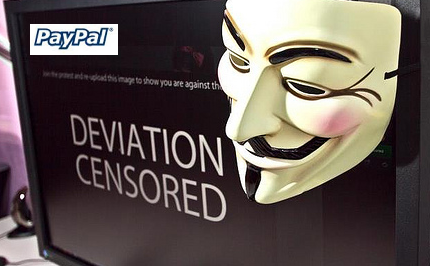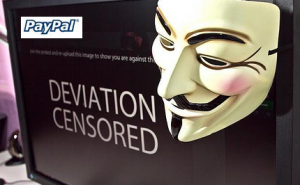
Paypal’s Dabblings With Censorship
 Paypal’s Dabblings With Censorship
Paypal’s Dabblings With Censorship
Last February, Paypal sent a letter to some online book distributors and retailers stipulating that they were required to “remove all titles with content containing incest, pseudo incest, rape, and bestiality, effective immediately.”
Failure to comply with their request would have dire consequences as shown in this extract of their letter
We request that you immediately log into your account and unpublish all titles that contain the restricted content. If you have uploaded titles containing restricted content and do not unpublish these titles as we are requesting, we will deactivate your entire publisher account, which will remove all your titles from sale.
We urge you to log into your account and remove these titles as soon as possible to prevent your account from being deactivated today.
If your account is deactivated, it may or may not be reinstated in the future. After deactivation, requests for reinstatement will require us to go through your catalog, which may take several weeks or longer for us to process.
Whether or not one approves or disapprove of the banned content, the questions this raises are: “What is behind Paypal’s sudden holier than thou attitude?” and ” Do Paypal demands constitute censorship?”
The answer to the first question is of course money. Yet, as sex sells, how can removing a certain category of porn from bookshelves translate into making more money? Note that Amazon also bans similar content from their catalog …
So why do these champions of capitalism volunteer to eliminate potential cash cows from their wares?
It all comes from credit cards policies to charge higher fees for what they define as “high risk” account. All major credit card companies offer their user a protection enabling them to dispute charges made to their account and get their money back. Certain categories of transactions, such as porn, gambling, tobacco and alcohol related product have a higher than usual percentage of these “chargebacks” procedures so credit cards feel justified in charging more money to process payment for those sites.
Paypal’s system relies heavily on credit card and they are only a middleman. This means that if they process payment from sites that carrying high-risk material, they will have to pay the high-risk costs of doing business, thus reduce their margins.
Reducing margins is definitely a censored item by Paypal and Amazon alike. If anything, it is THE most proscribed action they can think of.
Of course, they are not about to advertize that if they can conceal it by presenting their money saving rules as a moral stand. When limiting their clients’ freedom, it looks better to appear as the guardian of morality than as a greedy multinational ready to curtail freedom of expression simply to save a few bucks.
This leads to the next question.
Do Paypal demands constitute censorship?
Well, yes and no. If they are banning users because they want to be the guardians of morality, it would effectively constitute censorship, but a legal one. Christian bookstores do not sell porn books because they do not condone such literature and no-one is accusing them of censorship, they just choose which items they deem appropriate for their clients. Every business has the right to choose who they do business with as long as it does not infringes any law. Banning red heads from your wig shop would be discriminatory and therefore illegal. Choosing not to sell red hair wigs is a business decision, even if it is solely based on the shop owner dislike of red hair.
As a private company, Paypal has the right to define who they want to do business with. No-one would raise an eyebrow if they were to decide that only merchants with a monthly invoicing of over, say $10 000.
The difference in this case is that, because of their quasi-monopolistic position, they have the ability to impose their editorial preferences on media outlets. In fact, they could, if they so chose decide to refuse to process payment for media outlets supporting the republican side, or the democratic side for example. This would be called taking a political stand. Probably a money-losing move, but deemed political activism and therefore not labeled censorship.
In other words, had they stipulated in their request to remove the incriminating material is dictated by the terms and conditions of the credit cards companies they work with rather than appear to make a demand based on moral grounds, they probably would not have met with the resistance that caused them to water down their demands as appeared on their blog
First and foremost, we are going to focus this policy only on e-books that contain potentially illegal images, not e-books that are limited to just text. The policy will prohibit use of PayPal for the sale of e-books that contain child pornography, or e-books with text and obscene images of rape, bestiality or incest (as defined by the U.S. legal standard for obscenity: material that appeals to the prurient interest, depicts sexual conduct in a patently offensive way, and lacks serious literary, artistic, political or scientific value).
In addition, the policy will be focused on individual books, not on entire “classes” of books. Instead of demanding that e-book publishers remove all books in a category, we will provide notice to the seller of the specific e-books, if any, that we believe violate our policy. We are working with e-book publishers on a process that will provide any affected site operator or author the opportunity to respond to and challenge a notice that an e-book violates the policy.
Amusingly, this means that they are now in effect censoring individual books, turning them into effective censors.
So, though it seems that PayPal’s original move was dictated by business interest where, by chance, morality implied higher returns, they have now turn themselves into censors based on another logic than pure profit.